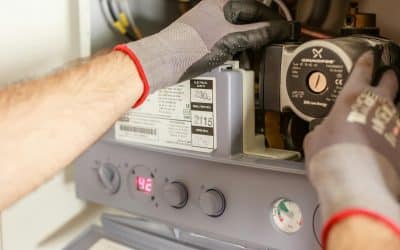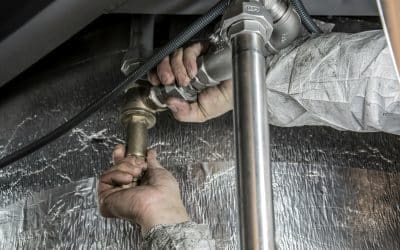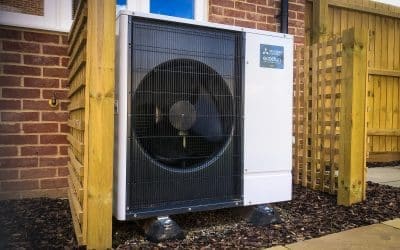For all intents and purposes, the functionality of both air source heat pumps and ground source heat pumps is basically the same. Heat pumps are able to transfer heat from natural renewable sources like air, ground and water to a residential or a commercial building. This absorbed heat is then used to heat water and rooms within your building.
But the question is, which of these is the better option for you?
In this piece, we’ll compare air source heat pumps (ASHP) and ground source heat pumps (GSHP) and see which one’s the right fit for your requirements. Additionally, our free quick quote will help us make the decision easier for you!
ASHP VS GSHP – Primary Differences
When you install an air source heat pump, it absorbs heat from the surrounding air by way of an outdoor unit that resembles a big fan. For a three-bedroom home, the typical measurement of this unit is 1.5m x 1.5m.
In case of ground source heat pump installation, heat is absorbed from the ground but it requires the laying of a series of loop pipes underground. These pipes can be placed either horizontally (area should be at least twice the size of the property) or vertically (boreholes up to 30 cm in diameter and 120m deep), depending on the availability of space.
However, there are several other factors that we can use for comparison purposes.
ASHP VS GSHP Costs
Taking into account the amount of outdoor work required, GSHP installation is likely to cost more. On the other hand, the financial incentives that you can receive under the RHI scheme can be comparatively greater. Both heat pumps are efficient at low temperatures which means that you need to have larger radiators. Underfloor heating is the ideal choice with both ASHP and GSHP. All things considered, GSHP installation costs for a three-bedroom home can range between £10,000-£15,000 whereas ASHP installation costs can be between £5,000-£7,000
ASHP VS GSHP Efficiency
GSHPs are 10 to 25% more efficient than ASHP. Therefore, in the long run, savings are comparatively greater with GSHP installation. Your savings are directly proportional to how long the system lasts and both ASHP and GSHP are highly durable.
ASHP VS GSHP
If the ground loops are properly installed and checked for water leaks, GSHPs don’t really need any maintenance. The ground loops should contain biocide and antifreeze to avoid the growth of bacteria in the water. These chemicals have a lifespan that spans over a decade so special attention has to be paid to water testing after 10 years have passed.
Similarly, ASHPs are also very durable and reliable and require occasional checks to make sure that the external airway and coil surfaces are free of any blockages.
Manufacturers tend to provide extended warranties on such renewable heating systems if you sign up for a yearly maintenance plan. So, to prolong the life of ASHPs and GSHPs, it’ll do you well to pay a small annual fee and let the experts take care of the maintenance and servicing required.
Earning Potential
Air and Ground source heat pumps are both eligible under the RHI scheme.
Although, this is where all the factors merge to make a strong case for GSHPs as the RHI scheme is likely to back up to 80-110% of the capital investment required for its installation. These payments will be made to you on a quarterly basis over a period of seven years for domestic RHI. Once that’s done, you can simply sit back and reap the benefits of cost savings which are significant when you switch from fuel-based heating systems to renewable heating systems.
RHI payments for ASHPs can cover up to 70-80% of the capital investment costs over seven years. After that, it’ll be far cheaper for you to run the system as compared to an electric or an oil-based heating technology. Although, you have to keep in mind that unless the ASHP system is well designed and installed in an adequately insulated home, it might cost you a bit more than gas-based central heating.
Which is Better, Ground Source Heat Pump or Air Source Heat Pump – Final Verdict
A ground source heat pump is almost always a more efficient alternative, when taking into account your expected returns. A horizontal ground source heat pump is more practical, although space will matter the most with this option as they take up far more room (albeit underground) than ASHP’s.
Air source heat pumps will continue to offer good tariffs under RHI and they are regarded as the most affordable and easiest to install system, particularly where space is compromised. A well designed and installed ASHP will offer low running costs and reduced carbon footprint as a heating solution that’s off the grid. This is why air source heat pumps are a rather popular choice in the UK.
The fact remains – if a heating system is installed, designed and maintained well, it will dispense efficient heat all-year-round! This is why having an experienced team on board is of utmost importance.
At JL Phillips, our team will help recommend the best heat pump solution for your requirements so get in touch with us today!





